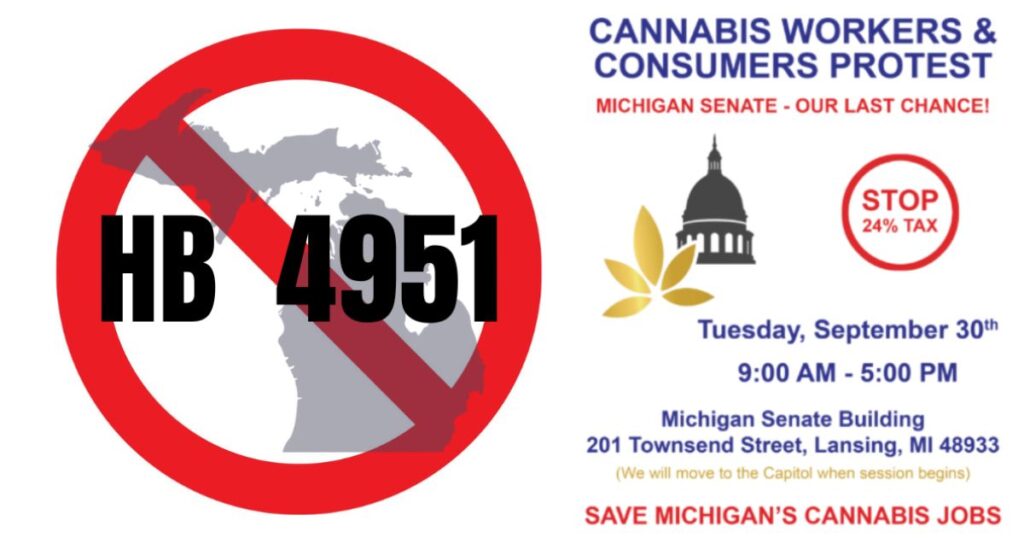The Michigan cannabis community is up in arms regarding HB 4951, which proposes to “raise $420M to fix the roads” via a 24% wholesale tax on licensed cannabis products. On Thursday, September 25, Michigan House Reps voted 78-21 in favor of HB 4951. On Tuesday, September 30, 38 Michigan State Senators will be casting their votes. If the State Senate passes HB 4951, it would take effect January 1, 2026.
In response to this unprecedented threat to the Michigan cannabis industry as we know it, the Michigan Cannabis Industry Association (MiCIA) has organized a full-day protest beginning at 9am on Tuesday, September 30 at the Michigan Capitol Building in Lansing.
What Michiganders Voted For in 2018
In 2018, Michigan voters passed Proposal 1: the Michigan Regulation and Taxation of Marihuana Act. This launched the formal licensed recreational market in Michigan, which has grown into the second largest cannabis market in the country behind California.
It can be asserted that the low 10% cannabis excise tax, in conjunction with the 6% state sales tax, has helped make the licensed Michigan cannabis market attractive to both locals and tourists alike. The low pricing often found in Michigan dispensaries can be attributed to the high saturation of competitors and products in the market, where there are unlimited licenses based on municipalities opting in. Despite Illinois having 25% more residents, the state’s cannabis industry having strict license caps and higher taxes has resulted in a less competitive market with much higher prices than Michigan.
Michigan’s Cannabis Industry Would Never Be the Same
This sudden passing of HB 4951 by Michigan House Reps is concerning to everyone involved in the industry, from owners, to budtenders, to consumers. If this gets passed by the Michigan State Senate, then it will lead to new challenges and irreparable damage.
Adding a 24% wholesale tax – where the retailer is expected to pay the tax burden – will likely lead to increased product costs for consumers, businesses of all sizes closing, and mass job losses. Due to the low prices that consumers are accustomed to, businesses are often operating at razor-thin margins especially given how much more expensive it is to operate in cannabis than any other industry in the US.
Michigan’s market is dominated by a demand for inexpensive / cheap products. While there is a market for top-shelf products, consumers predominantly seek the best bang for their buck to stretch their dollar. This will likely lead a good chunk of consumers to stop shopping in the licensed Michigan market if there are cheaper alternatives – effectively creating a beginning to the end of the MI cannabis market as we know it.
To quote Robin Schneider, MiCIA Founder and Director, in a recent MLive article: “ “I don’t think that citizens have a bunch of extra money laying around right now,” said Robin Schneider, director of the Michigan Cannabis Industry Association, a group that lobbies on behalf of marijuana businesses. “They’re going to go wherever they can get it cheapest. And yes, I think it will be cheaper on the illicit market.” ”
In my opinion, I believe that the $420M estimate that MI lawmakers made is not an accurate nor realistic assessment of what HB 4951 would generate tax-wise. If more people stop going to dispensaries because they had to raise their prices to pay for the wholesale tax, it would generate far less tax revenue overall.
Another key point Robin Schnieder made in that same MLive article: “ She believes tax revenue projection is a “completely fraudulent number,” since a large chunk of Michigan marijuana returns — she estimated 30% — comes from border sales to out-of-state residents.
“This will put us at the second highest cannabis tax rate in the country and we will lose our regional advantage, and therefore lose all of those border sales,” Schneider said. “There will be no reason for them to come here.” ”
Issues and Concerns to Consider with HB 4951
HB 4951 passing in the Michigan State Senate will likely lead to litigation from all angles of the industry, particularly from the business owners that invested in the recreational market based on the framework in the 2018 Prop 1 passed by Michigan voters.
To quote Jamie Lowell, notable community activist, as well as Robin Schenider, in the MLive article: “ However, bill opponent Jamie Lowell, president of Michigan’s National Organization for the Reform of Marijuana Laws chapter, and Schneider, say implementation won’t go unchallenged.
They believe a 3/4 super-majority is required to implement a new tax, since both recreational and medical marijuana laws were passed by voter ballot initiative.
“The 10% excise tax was purposefully put as the sole tax,” said Lowell, who advocated for and helped create the 2018 law. “The wholesale tax was left out on purpose. It wasn’t just left up for grabs.”
“It was passed by the people … and you can only amend it through a super-majority.”
The House vote fell five short of a super-majority.
Schneider said her organization is working with attorneys on a legal strategy, should the legislation pass. Any litigation would likely include a motion for an emergency injunction to halt the new tax, until the issue is resolved by the courts, she said.
“It’s going to be something that has to go through a different step to find out” if it’s legal or not, Lowell said. “And in my opinion, if a judge says it’s good, then the judge was wrong.” ”
Another layer: the Michigan cannabis industry sometimes deals with non-payment issues between retailers and producers. If a retailer does not pay a producer for an order – including the 24% wholesale tax – then this could cause issues with tax payments if a retailer fails to timely pay their bill. The CRA has proposed a new rule, where they can deny a license or renewal if the licensee has civil judgments or court orders for unpaid debts related to the cannabis industry, but it has not been formally enacted yet.
Some of the most notable concerns I have heard from leaders in the Michigan market:
- Mass job loss – thousands of people are at risk
- Businesses going under – especially small businesses / mom & pops
- Lost revenue due to decreased spending by tourists
- Product inaccessibility – from both retailers and producers closing
- Difficulty to remain profitable
- Misappropriation of funds – both cannabis excise tax and road funding
- Taxing cannabis 850% higher than alcohol
- Largest single tax increase proposed by the State of Michigan
Call and Email Michigan Senators ASAP
Click Here to locate Michigan Senators along with contact information. Time is of the essence to make an impact.

Summer Sky is a Ganjier and a seasoned consultant & advocate in the Michigan cannabis community. She is a co-host of the notable MiCannaCast podcast, a leading podcast focused on all things Michigan cannabis.
Summer Sky is backed by years of experience representing top-selling brands in the licensed market, has led a group of professionals to advocate for consumption reformation to the MI CRA in 2024, and has traveled internationally to study and connect with the greater community.

















